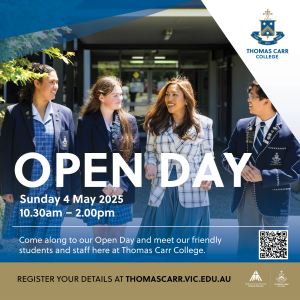One of our great tragedies as a society is the epidemic that is violence against women. Too often we hear that another young woman’s life has been taken by a man, usually someone known to her and, often, close to her. After one such horror, Victoria Police’s Assistant Commissioner, Luke Cornelius, made a clear point when asked to respond to the community’s concern regarding the safety of women. He said, “The key point is [that] this is about men’s behaviour. It’s not about women’s behaviour.”
I’d like us to take pause to reflect upon this. I know that some of our boys feel like they are being targeted and that negative generalisations surround them. However, we can only change this narrative if we change what underpins it. Our state’s Assistant Commissioner, a man himself, knows that we need to change men’s behaviour to ensure everyone, women and men alike, is safe. The statistics are clear:
- On average, one woman a week is murdered by her current or former partner.
- 1 in 3 Australian women have experienced physical violence since the age of 15.
- 1 in 5 Australian women has experienced sexual violence.
- 1 in 6 Australian women has experienced physical or sexual violence by current or former partner.
- 1 in 4 Australian women has experienced emotional abuse by a current or former partner.
https://www.ourwatch.org.au/understanding-violence/facts-and-figures
So what can we do?

Last week, Thomas Carr College collaborated with St. Joseph’s College, Geelong, and Iona College, Geelong, to engage with Richie Hardcore, a prominent educator, speaker and activist, working in family and sexual violence prevention, masculinities, mental health and fitness. Richie spoke to families about ‘masculinity’ as a concept, and how it is manipulated by myriad voices to the detriment of our young people. Social media content, in particular, can and does have a negative effect on our boys. One such concern is the rising popularity of Andrew Tate. I encourage you to read a little about his work here. There are also other factors that impact negatively on us all and Richie spoke about the challenges this presents to parents and teachers alike.
On Friday 5 May, Richie came and spoke to our Year 10 boys. The conversation was challenging and frank, but it was the conversation we needed to engage in. We aim to engage with our students, our families, and our staff to address the notion of masculinity and to teach our boys how to be good men, how to be the best they have been called to be. We know that masculinity is steeped in culture and that we both implicitly and explicitly practice a patriarchal and, at times, misogynistic acceptance of ‘boys will be boys’. Through these conversations and actions, we aim to guide and challenge our boys to become good men, men who do not resort to violence, to abuse, to aggression and to a sense of entitlement in order to assert themselves and to make their mark in the world. We want our boys to shine, to lead the way, to be creative, to be strong, to be whole.
I encourage all our families to talk to their sons about what it means to be a man today. I encourage us all to challenge aggressive, violent and abusive behaviours in all people; boys and girls, men and women. The more we address these challenges, the more we speak about it, the more we model healthy, safe and positive behaviour, the more of an impact we will have in the lives of our young people, including the women who are the faces behind the statistics.
Ivanka Spiteri
Deputy Principal – Student Engagement and Wellbeing



